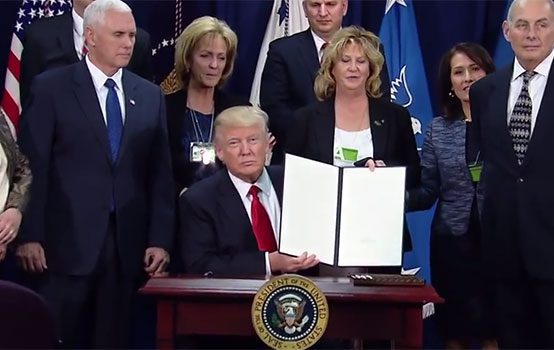Would the Public Rally Behind Trump in a Crisis?

Dan Drezner is worried:
For Trump to be polling this badly so early in his presidency is unprecedented. For this to be happening in a reasonably decent economy is even more unprecedented. What will an unpopular president who is obsessed with being popular do in such circumstances? Escalate a foreign policy crisis to get Americans to rally around the flag.
I wouldn’t rule out that Trump would do something so reckless in an attempt to salvage his political prospects at home, but I don’t think this would have the effect of rallying people behind him. Drezner notes that Trump’s low approval ratings at this stage of his presidency are unprecedented, and they are. Why is that? Most Americans don’t just think he is doing a poor job, but many of them also don’t trust that he knows how to do the job at all. If Trump were to escalate a foreign crisis in the hopes of boosting his approval rating, he would discover quickly that in doing this he had further eroded any remaining public confidence in his leadership.
For one thing, there would be widespread suspicion that he was making his decisions for cynical political reasons and not because he had legitimate national security concerns. Other ostensibly national security-related decisions that Trump has already made have been greeted with such suspicion, and with some justification. Given how tarnished (or non-existent) his credibility is with so many people already, a lot of Americans wouldn’t believe him no matter what he said about his reasons. It would also ensure that his presidency was dominated by preoccupation with foreign policy problems to the exclusion of almost everything else, and many of his supporters would not approve of that. Trump might still do something that foolish, but if he did it would be practically guaranteed to consume his presidency.
Except for Nixon, the modern presidents with the worst approval ratings (e.g., Truman, Bush, etc.) became so deeply unpopular in large part because of a war or some other crisis that they were perceived to have bungled. The idea that a president can revive his flagging political fortunes through foreign adventurism or ginning up an international crisis may seem plausible at first, but that isn’t what usually happens. Except for an attack on the U.S. or U.S. forces, it is hard to imagine a “rallying around the flag” moment happening given the extent of political polarization in the country. An escalating crisis seems more likely to become fodder for partisan attacks. Imagine how many of Clinton’s partisan opponents would respond under similar circumstances if she were president, and you get the idea.
Instead of rallying the public behind the president, we see in the record many times that the president’s failure to avert and/or solve the crisis or his responsibility for getting the U.S. into a costly, protracted war hardens domestic opposition to him and causes many of his former supporters to turn against him. That is even more likely to be result if the president is seen as the one responsible for instigating or worsening an otherwise manageable crisis.
Comments